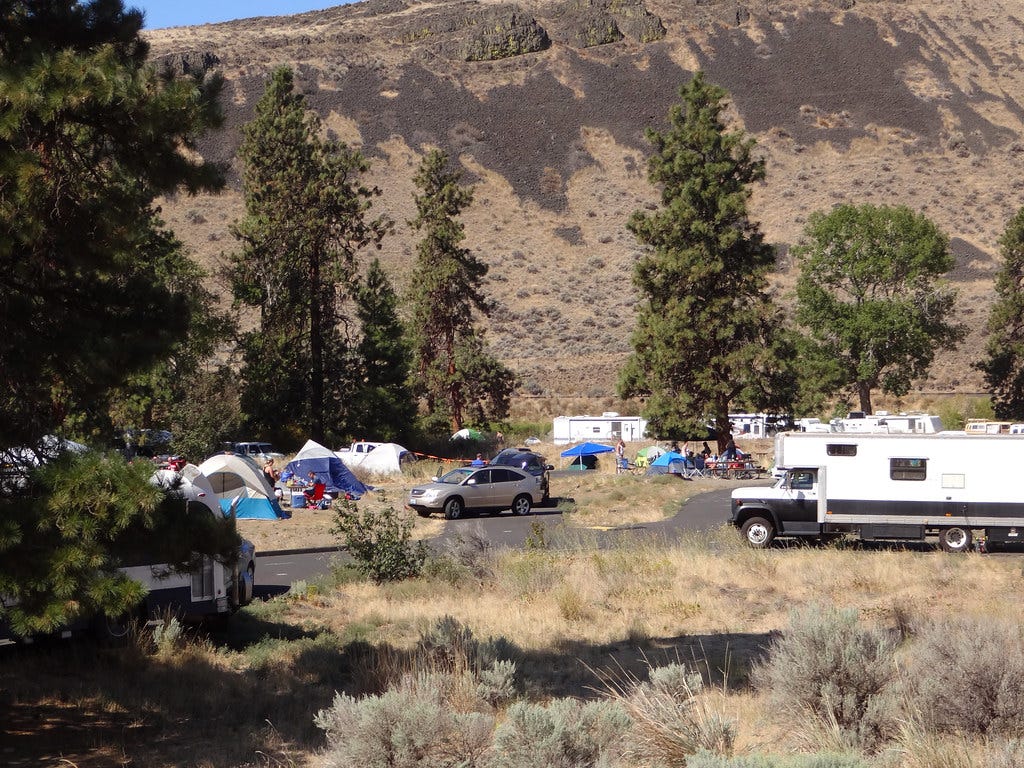"Camp Oregon"-an Oregon Solution to the Growing Problem of Political Segregation
And a way to begin to burst bubbles.
Editor’s Note: Do your part to Sustain the Way!
14 Oregonians have gotten us to $785 - keep the momentum going!
We’re just $215 from $1,000!
Donate hereor subscribe below to create a part-time editor position. Thank you! - kevin
Kevin Frazier edits The Oregon Way and attends the UC Berkeley School of Law. He graduated from the University of Oregon and previously worked for the state government.
“We know that with groups in general, when they’re separated, bad things happen,” Harvard researcher Ryan Enos shared that fairly obvious but obviously important quote in a recent New York Times piece covering the geographical separation of Americans by ideology.
Thanks to the work of Enos and his colleague, Jacob Brown, visuals of our political segregation make clear that we’re increasingly sorting into ideological enclaves. For example, the image above illustrates the ideological lines that divide Portland.
The distinctive pockets of blue and lack of overlap with red areas are characteristics seen throughout the United States. Consider that “about 25 million voters — urban Democrats especially — live in residential circles where at most only one in 10 encounters is likely to be with someone from the opposite party.”
One in ten…
The extent of this separation affects our daily lives in dramatic ways. When you know you’re surrounded by people who share nearly every aspect of your politics, it becomes easier to become less and less willing to consider new perspectives. In the words of Professor Ricardo Perez-Truglia, “If you know that everyone else is of your same party, you don’t have anything to lose. You can be very vocal; nobody’s going to disagree with you.”
A world in which no one disagrees with you may sound enjoyable, but it’s not a world in which diversity of thought can thrive. Remember what Enos said—separation of groups never works out well for the collective.
Regrettably, the article does not offer tangible solutions for overcoming the downsides of entrenched neighborhood-level partisanship and ideological homogeneity. But it’s clear that something has to change if we’re ever going to be able to tackle the big issues facing our state, country, and planet.
Bursting the ideological bubbles we live in is especially hard in Oregon, where mountains, rivers, and deserts seem to make interacting with a different bubble even harder. That’s why we need intentional programs to bring people from different parts of the state together in a meaningful way.
It’s time for Camp Oregon: a week every summer where entering-5th graders and 9th graders from different parts of the state gather in Central Oregon for all sorts of activities—ranging from team building to community service.
The camp could be operated jointly by entities like OMSI, Oregon Humanities, and AmeriCorps to provide a robust and informative experience for all participants. Scholarships would be afforded to kids from families experiencing tough financial situations. By selecting a location central to the state, participants could travel on school buses in under a day from wherever they reside in the state. Accomodations —tents and the like—could be set up like the Sleeping Fields for Hood to Coast. Just picture lines of small tents in a safe space with plenty of well-lit pathways to bathrooms, etc.

You may be thinking, “Sure, Kevin, this all sounds nice but how many kids are we talking about?”
Imagine 1,850 5th graders (5% of the nearly 37,000 5th graders recorded in 2016-17) going through the kid-equivalent of a professional conference or music festival. The next week, a similar number of 9th graders would attend.
If it sounds like a lot of kids, that’s because it is. But I have no doubts that the brilliant logistical minds that make Hood to Coast work, events like the Sasquatch! Music Festival go off without a hitch, and dynamic experiences such as Cycle Oregon a positive experience for all could come together for Camp Oregon. The important thing is that these young Oregonians would leave camp (hopefully having attended twice, in 5th and 9th grade) with friends in every part of the state.
Think to yourself, how many people do you know in each of Oregon’s 36 counties? How much do you know about what it’s like to live in Lake County? Have you ever talked to someone about a typical day in Yamhill County? You don’t need to answer those questions, but hopefully we agree that giving young Oregonians the gift of feeling welcomed by a friend in every corner of the state would move us collectively in the right direction.
Camp Oregon is a big idea. It’d cost a lot. It’d require a lot of volunteers and donations. It’d be a logistical nightmare.
And, it’d be transformative.
It’d be a sign of just how much we all cherish our shared Oregonian-ness. Finally, it’d prove that intentional efforts to combat political segregation are worthwhile.
***************************************
Send feedback to Kevin:
@kevintfrazier
Keep the conversation going:
Facebook (facebook.com/oregonway)
Twitter (@the_oregon_way)
Check out our podcast:




